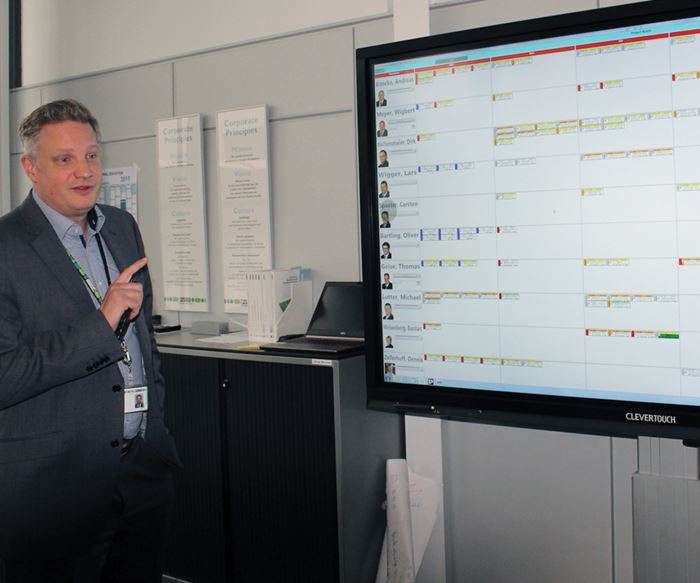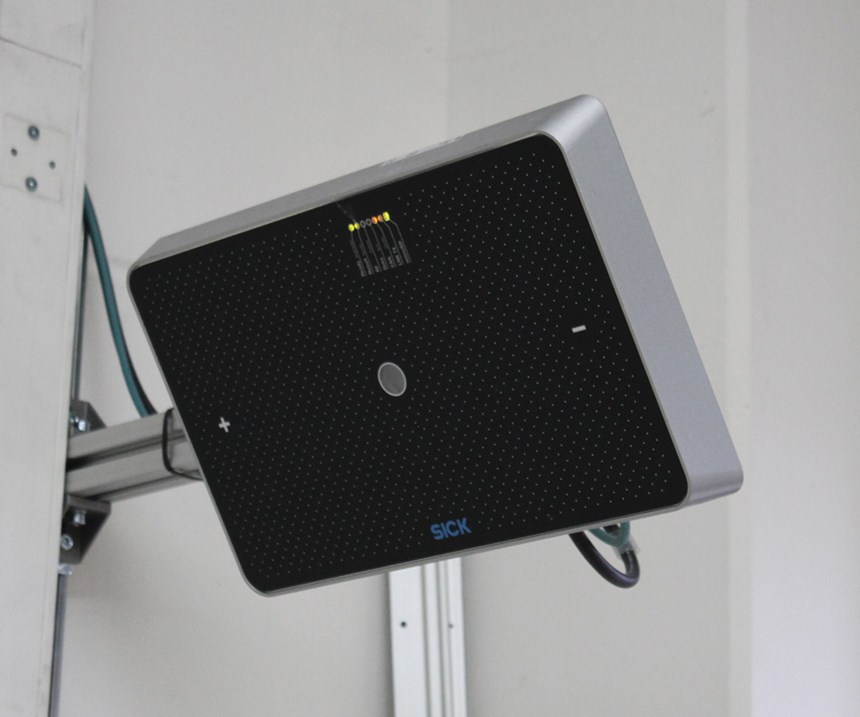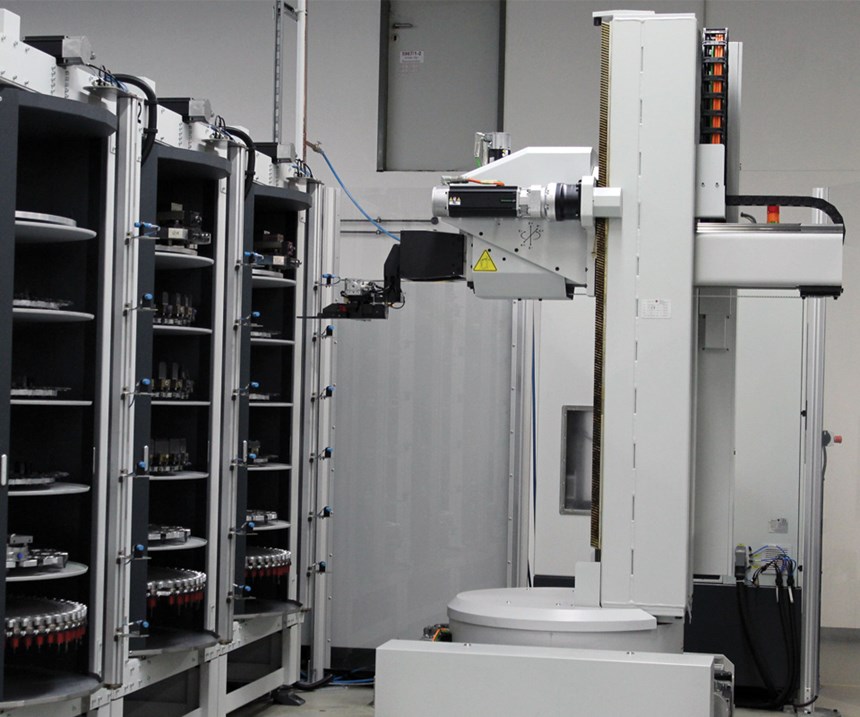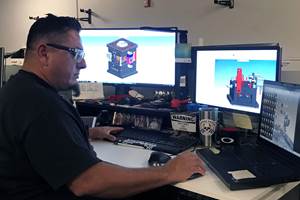International Perspective: Real-Time Visibility
Phoenix Contact, German Toolmaker of the Year, embraces the concept of Industry 4.0.
Everyone is talking about Industry 4.0. However, most tool and mold shops have an experience that is quite distinct from the possibilities offered by Industry 4.0, as many shops have yet to adopt automation technologies. By definition, Industry 4.0 is the current trend of automation and data exchange in manufacturing technologies. It includes cyber-physical systems, the Internet of Things and cloud computing. Industry 4.0 creates what the industry describes as a smart factory. For many shop owners, this definition would raise eyebrows as shop owners are likely skeptical of what they see as an empty catchphrase.
It certainly is not an empty catchphrase. A shop does not have to implement everything Industry 4.0 requires at once, like automated manufacturing cells, machines equipped with manufacturing execution systems (MES) or parts that autonomously communicate with machines via radio-frequency identification (RFID) tags. One key foundation of Industry 4.0 is visibility throughout the production process. Shops strive to measure their entire production process to improve lead times. However, shops cannot measure what they cannot see or sense. Many large and small operations have blind spots. That is, shops have no visibility into the real-time status of their manufacturing process, which makes it difficult to identify the right fixes at the right time and place to maximize production efficiencies.
German Toolmaker of the Year
The Fraunhofer Institute for Production Technology and the WZL tooling laboratory at the RWTH Aachen University in Germany organize the Toolmaker of the Year award. Last year, the toolmaking division of Phoenix Contact won the award because it embraced the idea of maximum visibility and transparency. Today, Phoenix Contact is arguably one of the most advanced and sophisticated tool and moldmaking shops in Germany.
Phoenix Contact, based in Blomberg, Germany, consists of 12 manufacturing companies and around 50 sales companies. Its product range includes components and system solutions for power supply, including renewable energy, as well as for device, machine and control cabinet engineering. Phoenix not only manufactures screws, plastic and metal parts in-house, but also highly automated assembly machines and punching and bending tools and injection molds. Phoenix Contact Tool Shop Plastics in Blomberg, which has three departments and 180 employees, controls its global network for injection mold construction. The product portfolio includes consulting services, prototypes, rapid tools and complex multi-cavity, high-speed tools.
The award’s jury praised the shop’s defined business model and the global day-to-day transparency of all projects. An information system, digital boards for order tracking and Gemba walks (a daily, scheduled time when the manager walks the shop floor and publicly reviews progress) ensures that transparency. Additionally, the jury positively assessed consistent increase in automation in production through expanded flexible automation cells.
For Ralf Gärtner, who was the head of Phoenix Contact’s tool shop plastics division until January 2017, Industry 4.0 is a great marketing tool. However, according to Gärtner, who also launched Protiq (a 3D-printing facility), the company has long been living that concept without giving it a specific name. This included integrating hardware into the digital world, making sure all order and systems applications and products (SAP) data is fed to the machines via an MES system and creating a globally digitized and standardized operation. This is so the tool shops in China, Poland and India are on the same level, can work with the same systems and processes and are adjusted to the local requirements.
“We have implemented a global tool shop information system, which is available for anyone around the globe at Phoenix. This in-house-developed system offers transparency across all databases and manufacturing processes. There are three people working here full time just to further develop and program this software,” Gärtner says.
Customer service and staying ahead of the competition motivated Gärtner and his team to optimize their processes so that they can cut lead times in half. Here are a few of the rules Phoenix lives by to remain an advanced German tool and moldmaker:
Be faster than the competition. “If we manage to enable Phoenix Contact to take its products to market faster than the competition, then we have created an added value for the company,” Gärtner says. He believes that for tool and mold shops to be competitive they must produce the best tools in the shortest possible time to empower the customers (internal or external) to produce their injection-molded parts as efficiently as possible.
A healthy mix of factors helped Phoenix cut lead times in its tool shop by 50 percent, including dedication, a good team and a fully transparent and flow-optimized production environment that allows everyone to be up to date with all necessary information in real-time.
Meet daily, and conduct Gemba walks. To understand what is behind all of this, the company examines its daily operations. For example, on Monday morning at 8:50 a.m., 10 engineers and production managers gather around a gigantic screen that displays a clearly structured and easy-to-use production planning tool. A simple touch on the screen allows the team to dive into a specific project, check the status of any tool that will be manufactured, check all machine statuses and check manufacturing steps.
The dominating color on the screen this morning is green, which means that most projects are going to plan and orders are being processed on time. There are three colors on the screen that show the progress of each project in every manufacturing step. Green indicates a project is on schedule. Orange indicates a project is just on the edge of being late or that there might be an emerging bottleneck in the project, and red indicates a project is behind schedule. The management team meets every morning from 8:50 a.m. to 9:00 a.m. to discuss the orange and red processes.
“The screen displays all information live, and it’s available for anyone in the organization. No more Excel spreadsheets or any other systems that need to be checked,” Gärtner explains. “All workers can now influence the planning and workpiece flow by simply using the touchscreen to move a step of the process back and forth in time. All of Tool Shop Plastics’ 180 people manufacturing 200 tools simultaneously every day are up to date with every single production step by 8:50 a.m the
next morning.”
“When I started with the company, I spent my afternoons touring the factory trying to solve problems,” adds Sven Holsten, who has been director of Phoenix’ tool shop plastics division since January 2017. “Every manager takes part in the Gemba walks on the shop floor to decide what tools to prioritize, how to solve problems and eliminate bottlenecks or what we need to outsource. Gemba walks involve going to see the actual process, understand the work, ask questions and learn. The goal is to eliminate all red colors, which are nonproductive times when the tool is just sitting somewhere waiting for the next production sequence.” Nonproductive times create 90 percent of a tool shop’s waste.
Implement automation. Automating production and the flow of information as much as possible involves every tool carrying an RFID tag. This not only automatically makes a machine tool download the appropriate CNC program to autonomously machine the part, but it also ensures that the system is always up to date with what tool enters the shop and which one leaves. RFID antennas on all roller doors detect whether a truck comes in with material or with parts and then feeds the information into the system.
An operator developed the touchscreen system in-house, and it has been in operation for two years. “The operator approached me and said he had developed an app that might be useful for the company’s system,” Gärtner says. “I told him to keep developing and freed him from most of his other tasks, and here we are today.”
Use lean processes. It is important to have all in-house processes clean and lean, to have each manufacturing step optimized and to have a paper version in place before digitizing the system. In Gärtner’s opinion that is the key to Industry 4.0, or the key to efficiently networking information, machines and SAP and MES systems.
The screens are not a mere means for the display of information, but are the core of Phoenix Contact’s unique, transparent, automated and lean production system. The company works according to the “first in, first out” (FIFO) principle.
All orders end up in the FIFO queue, which dictates the order in which a part moves on to the next operation. “To establish a FIFO queue, an overall analysis needs to be conducted to ensure that the capacity is sufficient to cope with the usual variations the shop can expect over a month of
production,” Gärtner explains. “If one section of the process is a stand-out bottleneck, then that will be the point of control for the production planning process.”
The stand-out bottleneck in Phoenix’ production process is the automated milling machine. The company has been working with fully-automated machines for the last 15-20 years. All three-axis machines have been replaced by five-axis machine tools. The DMC 75V linear milling machine from Deckel Maho with a pallet changer is the cornerstone of Phoenix’ FIFO concept, which drives an SAP-planned and reality-controlled process. Phoenix Contact outsources whatever this machine cannot handle and sits in the queue for more than two days.
“At the machine is where we control our production process,” Holsten explains. “We used to pre-plan everything in SAP. We don’t do that anymore. We design and develop all tools, so the engineering department runs to full capacity. We know in advance that our machining capacities are not sufficient to manufacture each and every tool in-house, but we feed them all into our FIFO system and then our bottleneck flow control system allows the system to run at full capacity.”
Small yellow cards next to each machine indicate current capacity utilization at a glance. For example, when a part to be milled enters the queue, an operator places a yellow card on the board, visible for anyone passing by. It is then moved to the next step when it is being machined or planned for the unmanned machining shift overnight or the weekend. “We know that every order that passes this point can be machined and assembled in subsequent manufacturing steps. If there is a delay of more than two days, the part or the complete tool is immediately outsourced to our suppliers all around the world.”
Similarly, this pull-system ensures that a part that has to be re-designed does not have to line up again. Instead it jumps the queue and is machined first because it has the lowest FIFO number.
“It is a self-optimizing system,” Holsten explains. “We clearly differentiate between planning and process control in the real world. We don’t plan with orders that might come, but with those that are actually at the machine in the form of steel. Since we introduced these inexpensive yellow cards into production in 2012, we have reduced throughput times by 50 percent.”
Related Content
Mold Design Review: The Complete Checklist
Gerardo (Jerry) Miranda III, former global tooling manager for Oakley sunglasses, reshares his complete mold design checklist, an essential part of the product time and cost-to-market process.
Read MoreWhat is Driving Mold Lifecycle Management Digitalization?
OEMs are looking to partner with suppliers to share and track data across the supply chain for advanced intervention and process management.
Read MoreEditorial Guidelines: Editorial Advisory Board
The Editorial Advisory Board of MoldMaking Technology is made up of authorities with expertise within their respective business, industry, technology and profession. Their role is to advise on timely issues, trends, advances in the field, offer editorial thought and direction, review and comment on specific articles and generally act as a sounding board and a conscience for the publication.
Read MoreThink Safety: Eliminate Hazards Throughout the Shop
The tooling community is taking advantage of new products for safer mold shops and molding facilities.
Read MoreRead Next
Int'l Perspective: European Trend Report - Optimism Prevails
The heads of several overseas manufacturing groups expect continued growth this year.
Read MoreHow to Use Strategic Planning Tools, Data to Manage the Human Side of Business
Q&A with Marion Wells, MMT EAB member and founder of Human Asset Management.
Read MoreAre You a Moldmaker Considering 3D Printing? Consider the 3D Printing Workshop at NPE2024
Presentations will cover 3D printing for mold tooling, material innovation, product development, bridge production and full-scale, high-volume additive manufacturing.
Read More
























